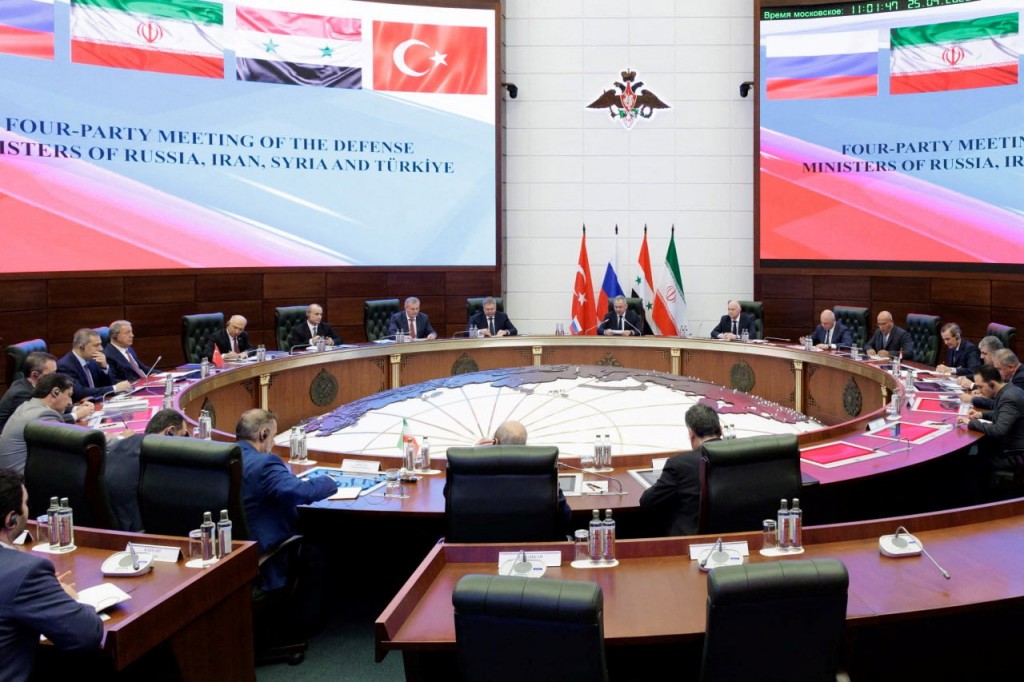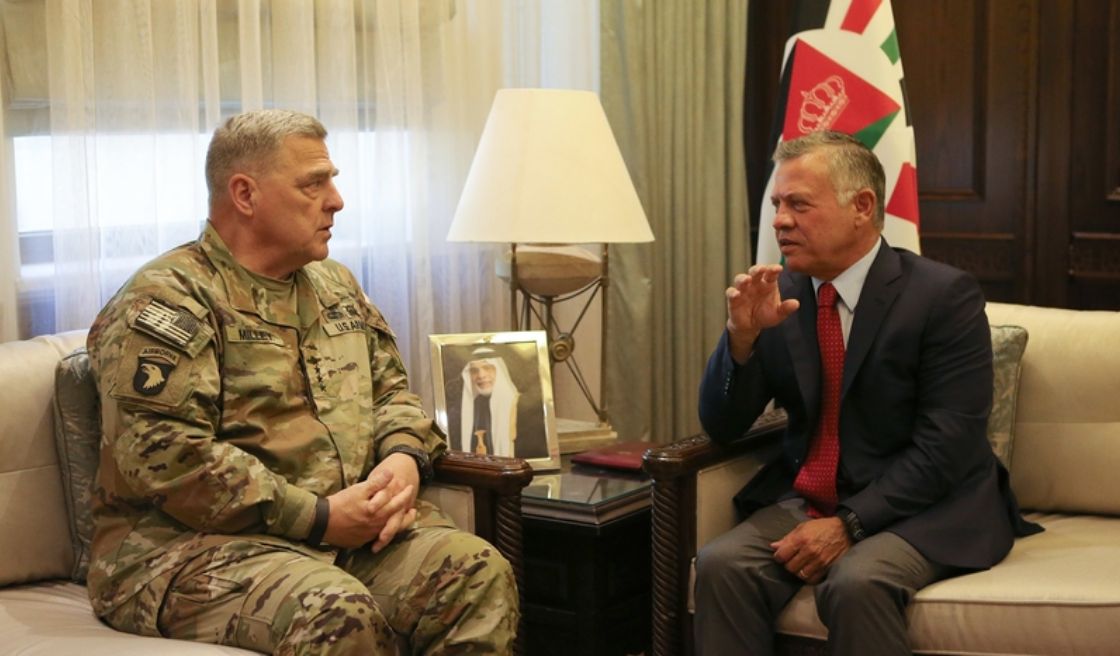- Articles
- Posted
What Lies Behind Jordan’s Threats of a “Military Action” in Syria?
These days, the prevailing trend regarding the Syrian crisis, at least in appearance, is one towards reconciliation, settlements, and calming at the level of relations with the Arab countries and Turkey. That is despite what the extremists seek to promote against the settlement, particularly with Turkey.
This trend includes mutual high-level diplomatic visits with a number of Arab countries, as well as the ministerial meeting that took place in Amman on May 1, and before that the Jeddah meeting. Before those, and in parallel with them, there is also the continuous Astana work to achieve a Syrian-Turkish settlement, including so far two meetings at the level of defense ministers, a meeting at the level of deputy foreign ministers, and an upcoming meeting at the level of the foreign ministers, in addition to a number of meetings at lower levels, with high Russian-Iranian-Turkish coordination.

Opposite this general atmosphere, Jordanian Foreign Minister Ayman al-Safadi, during an interview with American channel CNN on Friday, May 5, dropped a bomb that so far seems to just be merely a sound and media bomb, but it is not certain that it is just that. In this we mean the following statement he made: “We are not taking the threat of drug smuggling lightly. If we do not see effective measures to curb that threat, we will do what it takes to counter that threat, including taking military action inside Syria to eliminate this extremely dangerous threat not just in Jordan, but through Jordan to the Gulf countries, other Arab countries and the world”.
Even merely talking about an external “military action” targeting Syrian territories, puts back on the table previous coordinates that existed when Amman was the headquarters of the Military Operations Center (MOC), through which the Americans and the British managed a major part of the attrition, destruction, and sabotage process in Syria over the years. However, before we go further in talking about the meaning of the Jordanian threat, we must ponder its pretext: drugs.
How can drug production and smuggling in Syria be stopped?
It is indisputable that, in light of the crisis and devastation that has been ongoing for more than a decade, Syria has turned into one of the centers of drug production and smuggling in the world, especially through the product called “Captagon”.
This process generates billions of dollars in profits for a handful of influential warlords and those in power, who themselves represent the “natural evolution” of the major corruption figures in Syria (see: Corruption and Plundering Transformations in Syria, a Continuous Context Deepened and Sped up by the Crisis (in Arabic)). Those major corruption figures, through 30-40 years, went through successive evolutionary stages: from being just bureaucratic bourgeoisie benefitting by virtue of its positions within the state apparatus from the market while remaining on its margins, to the stage in which it intensely struggled with the parasitic bourgeoisie, leading to this bureaucratic bourgeoisie itself transforming into a parasitic bourgeoisie in the 1990s. Gradually, this same group transformed into finance capital. Its latest transformation – driven by Western sanctions in particular – into criminal finance capital, one of the most important activities of which these days is the Captagon, which is not its only activity.
There is also no doubt that many countries and peoples, near and far, have been affected and are being affected by the production and smuggling of Captagon. However, this should not hide a certain fact, which is that the Syrian people themselves will be most adversely affected by this process, before any other people.
So, what is the solution?
The ultimate solution to this issue is certainly a complex one that requires a radical change in the conditions that allowed the production and smuggling of Captagon. In a word, the solution necessarily passes through ending the Syrian crisis itself, and through a political solution leading to a new regime in a Syria, whose land and people are unified. The solution also implicitly passes through ending Western blockade and sanctions, or securing real alternatives that annul their effect, and starting a comprehensive reconstruction process.
Jordan is claiming that it is not willing to wait for such a solution to be achieved, which may take years, and that it is “forced” to act quickly, even if “alone”, that is, without the other Arab countries.
The simplified picture presented by the Jordanian foreign minister suggests that a “Jordanian” military operation in southern Syria can provide a solution to smuggling drugs from Syria to Jordan, or through it to other destinations.
That is, Jordan implicitly admits that the most a supposed military operation against Syria can achieve is to stop smuggling, and not production. That is, production can continue as is after such a supposed operation. It is known that the possibilities of drug smuggling in countries that are most cohesive in the security and political sense are enormous. The Jordanian Minister can look at the US-Mexican example (since the US is always an important example for Jordan).
A pretext, not a reason
This is on the one hand, but on the other hand, the assumption that a Jordanian military operation would stop smuggling operations towards Jordan is absurd in a practical sense, for the following obvious reasons:
1- No military action can be launched without there being a clear enemy to fight. Can Jordan explain to us how it will operate against drug production and smuggling gangs using a military operation?
2- The process of producing and smuggling drugs in Syria, although it appears to be of a centralized nature, is carried out at microscopic levels. That is, a Captagon production unit could consist of a family of three, and a smuggling unit could consist of a few people. The coordination and organization processes are carried out in a mafia way, so that cutting off or terminating any number of separate production and smuggling cells practically does not affect the continuity of production and smuggling.
3- Therefore, a question arises: Will the Jordanian army raid the homes of Syrians to search for drugs? Will it do so in parts of the south, or will thousands of Jordanian troops will be allowed to raid all of Syria to stop production everywhere therein?
4- Will the Jordanian army engage in a street war with the drug mafias? Does it know what losses will befall Syrian civilians in such a scenario? Does it itself have the ability to bear the losses that may befall it?
5- Since eradicating drug production through military action is impossible, and the supposed task is to end smuggling towards the Jordanian border, the advice that should be given to the Jordanian authorities – if the whole matter is not just an excuse – is that it deploys its entire army on its northern borders, or even recruit tens of thousands of volunteers for this particular task. This would be more economical for the Jordanian treasury, which is already enduring plenty of problems. More importantly, such a scenario greatly reduces additional Syrian and Jordanian bloodshed, while providing many job opportunities that the Jordanian people desperately need.
6- More important than all this, whoever has genuine intentions to combat drug smuggling from Syria should be genuinely involved in working towards a real and comprehensive solution to the Syrian crisis. This certainly cannot be done through continuous coordination with the US and Britain, and always behind them, the Zionist entity.
Behind the scenes
While Jordan seems to be singing its own tune, it is not really alone; behind it lie the following:
1- Although the Arab countries these days seem formally to be on the same page with regard to dealing with the Syrian situation, the truth is that there are actual contradictions in perceptions and interests, and an essential part of these contradictions stems from the nature of the international alignment of these countries.
2- Jordan and the UAE are at the forefront of the countries that appear, with sufficient clarity, to revolve in the American, British and “Israeli” orbit with regard to the Syrian issue. These two countries shared the job of promoting the two most important Zionist projects in the region: the UAE, the Abraham Accords; and Jordan, the Arab NATO.
3- On the other hand, the main Arab countries, led by Saudi Arabia and Egypt, and by virtue of their significant weight, and in light of the current acute international conflict, were able to benefit from the circumstance in acquiring a greater degree of independence from the West. This degree is of independence is increasing day after day, prompted by general circumstances, and by political choices being taken, especially in Saudi Arabia. In this sense, it is not in Saudi Arabia’s interest to act as an agent of the West, which still sees that the goal in Syria is partition, fragmentation, and prolongation of the crisis. This is well understood by countries regardless of what they say and what is said in the media.
4- As the Syrian-Turkish settlement process under the auspices of Astana accelerates, and in parallel the Arab-Syrian relations improve, the Arab-Iranian and the Arab-Turkish relations also improve, and the coordination deepens between Russia and China with the Arabs, especially Saudi Arabia, the coordinates of resolving the Syrian crisis without the West and despite it, are almost complete. This does not suit the Americans or the “Israelis” in any way.
5- Jordan conducting a military action, in cooperation with its “allies”, will automatically mean activating the US-British al-Tanf base, giving it a “job” that will prolong its stay in Syria and relieve pressure on it and the entire US presence in Syria.
In this sense, Jordan’s threat of military action in the name of protecting its national security may constitute a temporary way out to prolong the crisis, a way out for the Westerners and the Zionists. Certainly, if it happens, it will be a dilemma that drains Jordan and Syria together, and make the drug trade deepen and grow. The extremists among the Syrian warlords might not have an objection to such action that would postpone the political solution for a while, even if it means more Syrian bloodshed, suffering, and death.
Patriotic Jordanians and Syrians should work together against such a possibility, and the main Arab countries should clearly stand against it. In parallel, Syrian political forces from the various sides should openly reject such a possibility, because it will clearly lead to the following:
1- Deepening and expanding drug trade.
2- Deepening the Syrian crisis and delaying its solution.
3- Pushing Jordan to a state of attrition that will deepen its existing economic crises and open the door to turning those crises into large-scale political ones. We believe that this is certainly not beyond the goals of the main architects of this whole thing.



